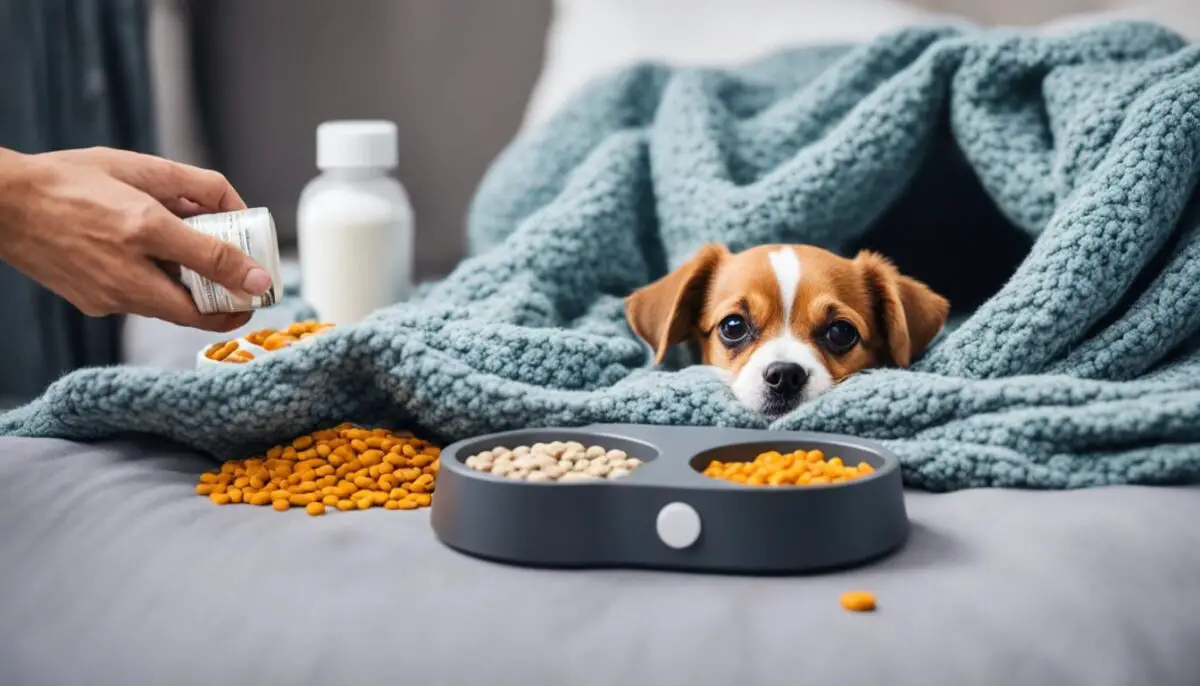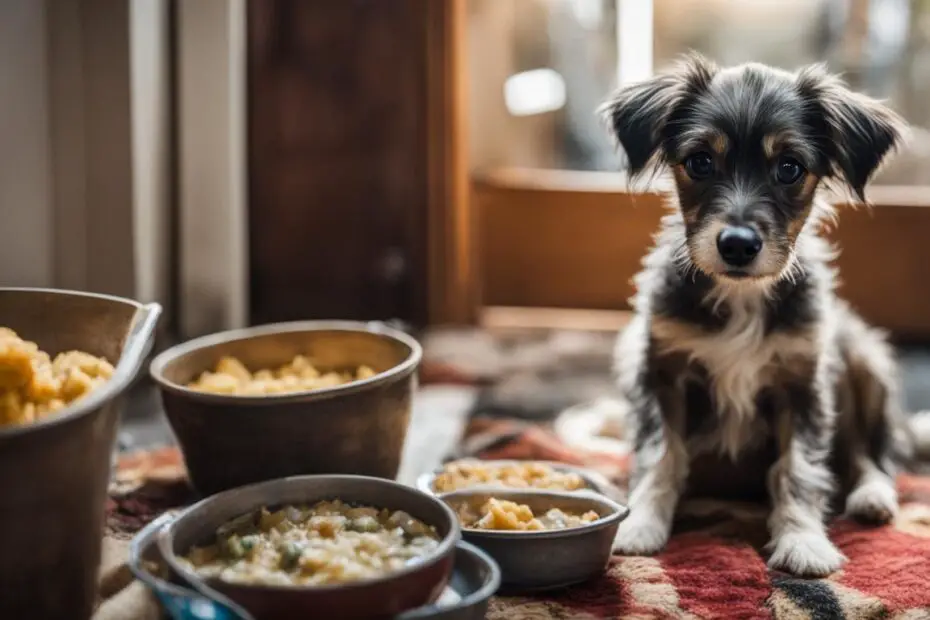Welcome to our guide on caring for your runt dog! Runt dogs, known for their small size and unique breed characteristics, require special attention and care to ensure their well-being. Whether you’re a proud owner of a runt dog or considering adopting one, understanding their specific needs is essential for providing a happy and healthy life for your furry friend.
Key Takeaways:
- Runt dogs have unique breed characteristics due to their small size and underdeveloped bodies.
- They are more prone to health issues and may require extra care and monitoring.
- Proper nutrition, including high-calorie puppy food, is crucial for their growth and development.
- Training runt dogs may require additional patience and understanding of their behavior.
- Consulting with a veterinarian is essential for personalized advice specific to your runt dog.
Health Issues and Care for Runt Dogs
Runt dogs, due to their underdeveloped bodies, are more susceptible to health issues than their larger counterparts. As a result, they require extra care and monitoring to ensure their overall well-being. Proper care is crucial, especially when adopting a runt dog, as it involves understanding and addressing their specific needs.
Regular check-ups with a veterinarian are essential for runt dogs to detect any potential health problems early on. These check-ups can help identify and manage issues that could arise from their smaller size and weaker immune systems. Vaccinations play a vital role in protecting runt dogs from common illnesses and should be administered according to the veterinarian’s recommendations.
A clean and safe environment is crucial for the health and happiness of runt dogs. They are more susceptible to infections and diseases, so it’s important to maintain good hygiene practices in their living space. Regularly clean their bedding, toys, and food bowls to prevent the buildup of harmful bacteria.
“Ensuring the health and well-being of runt dogs requires knowledge and diligence. Adopting a runt dog comes with the responsibility of providing the specific care they need, which includes regular check-ups, vaccinations, and a safe living environment.” – Dr. Emily Walker, Veterinarian

While runt dogs require additional care and attention, providing them with a loving and nurturing home can significantly improve their quality of life. By being proactive in addressing any health concerns, maintaining regular vet visits, and creating a safe space for them, you can ensure that your runt dog lives a happy and healthy life.
| Common Health Issues in Runt Dogs | Preventive Measures |
|---|---|
| Low birth weight | Ensure proper nutrition and monitor weight gain |
| Weaker immune system | Stay up to date on vaccinations and provide a healthy diet |
| Growth and developmental delays | Regular check-ups with a veterinarian and tailored care |
| Respiratory issues | Avoid exposure to smoke, dust, and other irritants |
By being attentive to their unique care requirements, you can give your runt dog the best chance at a happy, healthy life. Remember to consult with a veterinarian for personalized advice and guidance specific to your runt dog’s needs.
Nutrition for Runt Dogs
Proper nutrition is crucial for the growth and development of runt dogs. Due to their small size and potential health issues, runt dogs may have specific dietary needs that require extra attention. Providing them with the right balance of nutrients is essential for their overall well-being.
When it comes to runt dog nutrition, there are several key factors to consider:
- Supplemental Feeding: Runt dogs may require supplemental feeding to ensure they receive the necessary nutrients. This can include high-calorie puppy food or milk replacers, especially during their early stages of development. Consult with a veterinarian to determine the appropriate supplements for your runt dog.
- Feeding Schedule: Establishing a consistent feeding schedule is important for runt dogs. They may need to eat smaller, more frequent meals to aid in digestion and prevent issues like hypoglycemia. Divide their daily portion into multiple servings and feed them at regular intervals throughout the day.
- Balanced Diet: Offer a balanced diet that is tailored to their specific needs. Look for dog food formulas that are specially formulated for small breeds or runt dogs. These diets are typically higher in calories and contain the necessary nutrients for their growth and development.
Recommended Dog Food Brands for Runt Dogs
“When selecting a dog food brand for your runt dog, look for reputable brands that prioritize quality ingredients and cater to the nutritional needs of small-sized breeds. Some recommended options include Royal Canin Small Breed, Hill’s Science Diet Small Paws, and Purina Pro Plan Focus Small Breed.”

| Key Nutrients | Benefits | Sources |
|---|---|---|
| Protein | Supports muscle growth and repair | Lean meats, fish, eggs, and legumes |
| Omega-3 Fatty Acids | Promotes healthy skin and coat, reduces inflammation | Fish oil, flaxseed, and chia seeds |
| Calcium | Strengthens bones and teeth | Dairy products, leafy green vegetables, and fortified dog foods |
| Vitamins and Minerals | Support overall health and immune function | Fruits, vegetables, and dog food fortified with vitamins and minerals |
Training and Behavior of Runt Dogs
Runt dogs may require specific training and behavior approaches to help them thrive. Due to their small size and potential health issues, they may need additional patience and consistency during the training process.
Understanding the personality traits of runt dogs is essential for successful training. Each dog is unique, and their individual characteristics can influence their behavior. Some runt dogs may be more timid or fearful, while others may exhibit assertive or dominant tendencies.
It’s important to tailor your training methods to suit the personality of your runt dog.
Positive reinforcement, along with firm and gentle guidance, is typically the most effective approach for training runt dogs. Consistency in commands and rewards will help them learn and respond positively.
Key Tips for Training Runt Dogs:
- Start training sessions early to establish good habits and behavior patterns.
- Keep training sessions short and frequent, as runt dogs may tire more quickly.
- Use rewards, such as treats or praise, to motivate and reinforce desired behaviors.
- Avoid harsh punishment or negative reinforcement, as it can be detrimental to their confidence and well-being.
- Practice socialization to expose your runt dog to new experiences, people, and other animals, gradually and in a controlled manner.
Remember that each runt dog is an individual, and their training progress may vary. Be patient, understanding, and flexible in your approach. Consulting with a professional dog trainer can also provide valuable guidance tailored to your runt dog’s specific needs.
Training and behavior of runt dogs are important aspects of their overall well-being and happiness.
Conclusion
Caring for a runt dog requires special attention and understanding of their unique needs. These small-sized dogs, known for their adorable appearance and breed characteristics, may be more prone to health issues compared to other dogs. However, with proper care and guidance, you can ensure their health and well-being.
When considering runt dog adoption, it is important to be aware of the specific care requirements they may have. Regular check-ups, vaccinations, and a clean and safe environment are essential for their overall health. Consulting with a veterinarian will provide personalized advice and guidance tailored to your runt dog’s needs.
Nutrition plays a crucial role in the growth and development of runt dogs. They may require supplemental feeding, high-calorie puppy food, and milk replacers to ensure they receive proper nourishment. Following a feeding schedule and providing a balanced diet will support their overall well-being.
Runt dogs may have unique training and behavior needs, which require additional patience and consistency. Understanding their personality traits and adapting training methods accordingly will help foster a positive and well-adjusted behavior. With consistent training, you can help your runt dog become a well-mannered and happy companion.
FAQ
What is a runt dog?
A runt dog is the smallest and often the weakest one in a litter of puppies. They may have been born prematurely or experienced stunted growth in the womb.
Are runt dogs more prone to health issues?
Yes, runt dogs are more prone to health issues due to their underdeveloped bodies. They may require special care and monitoring to ensure their health and well-being.
What care do runt dogs require?
Runt dogs require regular check-ups, vaccinations, and a clean and safe environment. It is essential to meet their specific care needs to ensure their overall health.
Is special nutrition necessary for runt dogs?
Yes, proper nutrition is crucial for the growth and development of runt dogs. They may require supplemental feeding, high-calorie puppy food, and milk replacers to ensure they receive the necessary nutrients.
How should I train a runt dog?
Training a runt dog requires additional patience and consistency due to their small size and potential health issues. Understanding their personality traits and adapting training methods accordingly will help foster a positive and well-adjusted behavior.
What is the personality of a runt dog like?
Runt dogs can have unique personalities, just like any other breed. While there are no specific personality traits associated with being a runt, each dog will have its own individual temperament.
